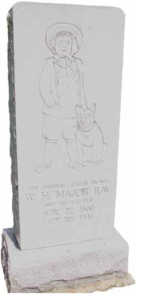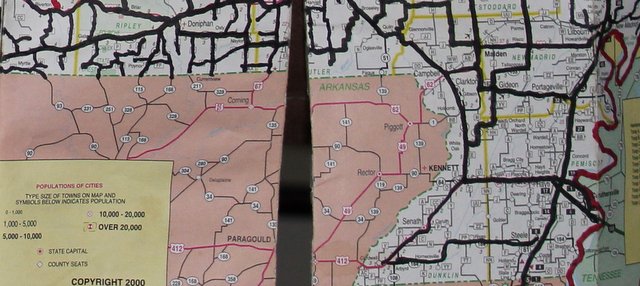Dunklin is Missouri’s tallest county, standing almost 44 miles from its sole to its crown, and shaped like the left side of  an hourglass, seemingly stuffed with cotton, mostly, until I scratched a little deeper.
an hourglass, seemingly stuffed with cotton, mostly, until I scratched a little deeper.
Down near the border, just three miles from Arkansas I uncovered an icon from my childhood. Southwest of Hornersville, down a dirt road, a cemetery holds the remains of Buster Brown.
Most kids who grew up wearing Buster Brown shoes probably thought Buster was a kid. Not so. He was born Major Ray back at the beginning of the Civil War, and he stopped growing when he reached 44 inches tall. He was a circus performer until he retired to Hornersville and opened a general store, where he sold Buster Brown shoes. In 1900 he convinced the Brown Shoe Company to make him spokesman for the brand. At 40 years old, Major Ray became Buster Brown. He died in 1936, and sometime thereafter, folks erected a tombstone with his likeness, dressed as Buster Brown. He’s a memory now, same as the empty shoe factories that dot the Bootheel landscape.
The old cotton gin at Pascola looks abandoned, too, but a flatbed wagon in back betrays cotton balls stuck in its cage. The gin itself is a giant on the flat landscape, a sprawling rusted two story tin shed. But come cotton harvest, this contraption comes alive, digesting enough cotton seeds to panel your basement.
I’ve heard stories about the rigors of picking cotton, but never in the excruciating detail described by a friend who offered a first-hand account.
“As a kid, it’s one of the first things I remember,” Bob said. Picking cotton is hard to forget. It’s hot, backbreaking knuckle scraping work. Children have one advantage: They don’t have to bend over as far to pull cotton off the scrubby plants. “We were dirt poor, and the cotton harvest was one of the biggest opportunities to make some money to buy food and shoes. Mom had us kids out in the fields at dawn, with our gunny sacks, ready to start pulling cotton bolls off the plants. Mom was smart. On the first day, she told us kids, ‘I’ll give you two cents a pound.’ We picked like crazy, and she paid us at sundown. Next day we were up early again, ready to go, and she said, ‘Now, you must pick as much as you did yesterday.’ She didn’t pay us for that.”
This half-hourglass cotton county has sturdy souls.
Share this Post
